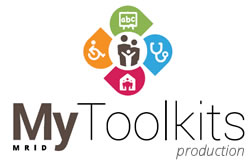Medical appointments are the main way in which clinicians provide care and support to families of those with complex health needs. Using a Co-Design approach, professionals, consumers and carers work together to determine the best strategies to suit a family’s particular circumstances. By also organising events that bring together consumers and clinicians in other ways, health services can offer different support to their clients and create new innovative platforms for collaboration.
Clinic-based activities are co-ordinated by health professionals and typically take place at a health service site. Rather than meeting with one individual family, clinicians invite multiple families and other professionals to meet, talk and exchange ideas as a group. Events might be informal or formal, such as a casual morning teas or information evenings, and may include both educational and social components.
At these events there are many opportunities for mutual learning and development. The experience of meeting in a physical space usually associated with medical consultations, but now in the context of a different kind of group event, gives rise to chances to relate in new ways. There is considerable potential in this for breaking down barriers and building rapport in ways that may help both individual families and the client group as a whole.
Hosting Successful Clinic-Based Events and Activities
Clinic-based activities, like any group events, require planning and coordination, but needn’t be overly complicated. Some factors to consider include:
- Invite consumers with a common interest (e.g. a particular condition or syndrome), and make this connection clear, along with the purpose of the event.
- The size of the physical space at the health service may determine the maximum group number and event format. Alternative venues may be found for larger events.
- Small groups can be focused and more intimate. Consideration may be given to hosting a series of small events so different people can attend on different days.
- Larger groups offer opportunities to consult with several people at once and may provide a clearer sense of a group’s collective interests and priorities.
- Give ample notice so that people can make necessary arrangements to attend. Holding events at a regular time each month may make it easier to plan ahead.
- Daytime events may be geared to involving primary carers in particular. Childcare or supervision arrangements may need to be offered so that carers are free to attend.
- Evening events do not tend to require provision of childcare, as most families can arrange for one carer to attend. This also caters for those who are unable to attend in the daytime.
- Events may be entirely informal (so that all participants are free to talk amongst themselves throughout) or may also include some whole group discussion.
- Themes for presentations should be guided by consumers or carers requests, as established through formal or informal feedback and input processes.
- Questions from the group should be allowed as part of any presentation so that key points can be raised and explored.
- Video or teleconferencing facilities may allow consumers and carers who are unable to attend to hear from speakers and participate in facilitated group discussions.
- Food and drink are great levellers. All activities and events should include opportunities for everyone to eat and drink together.
Clinic-based events may involve clinicians seeking feedback about the services they provide and ideas for future directions and development. These issues also arise naturally during informal discussions. Either way, it is important that some form of review is undertaken after any clinic-based event, to consolidate what was learnt and to act on ideas for service development that have arisen.




